#Technology of the Self
Text
How lock-in hurts design

Berliners: Otherland has added a second date (Jan 28) for my book-talk after the first one sold out - book now!

If you've ever read about design, you've probably encountered the idea of "paving the desire path." A "desire path" is an erosion path created by people departing from the official walkway and taking their own route. The story goes that smart campus planners don't fight the desire paths laid down by students; they pave them, formalizing the route that their constituents have voted for with their feet.
Desire paths aren't always great (Wikipedia notes that "desire paths sometimes cut through sensitive habitats and exclusion zones, threatening wildlife and park security"), but in the context of design, a desire path is a way that users communicate with designers, creating a feedback loop between those two groups. The designers make a product, the users use it in ways that surprise the designer, and the designer integrates all that into a new revision of the product.
This method is widely heralded as a means of "co-innovating" between users and companies. Designers who practice the method are lauded for their humility, their willingness to learn from their users. Tech history is strewn with examples of successful paved desire-paths.
Take John Deere. While today the company is notorious for its war on its customers (via its opposition to right to repair), Deere was once a leader in co-innovation, dispatching roving field engineers to visit farms and learn how farmers had modified their tractors. The best of these modifications would then be worked into the next round of tractor designs, in a virtuous cycle:
https://securityledger.com/2019/03/opinion-my-grandfathers-john-deere-would-support-our-right-to-repair/
But this pattern is even more pronounced in the digital world, because it's much easier to update a digital service than it is to update all the tractors in the field, especially if that service is cloud-based, meaning you can modify the back-end everyone is instantly updated. The most celebrated example of this co-creation is Twitter, whose users created a host of its core features.
Retweets, for example, were a user creation. Users who saw something they liked on the service would type "RT" and paste the text and the link into a new tweet composition window. Same for quote-tweets: users copied the URL for a tweet and pasted it in below their own commentary. Twitter designers observed this user innovation and formalized it, turning it into part of Twitter's core feature-set.
Companies are obsessed with discovering digital desire paths. They pay fortunes for analytics software to produce maps of how their users interact with their services, run focus groups, even embed sneaky screen-recording software into their web-pages:
https://www.wired.com/story/the-dark-side-of-replay-sessions-that-record-your-every-move-online/
This relentless surveillance of users is pursued in the name of making things better for them: let us spy on you and we'll figure out where your pain-points and friction are coming from, and remove those. We all win!
But this impulse is a world apart from the humility and respect implied by co-innovation. The constant, nonconsensual observation of users has more to do with controlling users than learning from them.
That is, after all, the ethos of modern technology: the more control a company can exert over its users ,the more value it can transfer from those users to its shareholders. That's the key to enshittification, the ubiquitous platform decay that has degraded virtually all the technology we use, making it worse every day:
https://pluralistic.net/2023/02/19/twiddler/
When you are seeking to control users, the desire paths they create are all too frequently a means to wrestling control back from you. Take advertising: every time a service makes its ads more obnoxious and invasive, it creates an incentive for its users to search for "how do I install an ad-blocker":
https://www.eff.org/deeplinks/2019/07/adblocking-how-about-nah
More than half of all web-users have installed ad-blockers. It's the largest consumer boycott in human history:
https://doc.searls.com/2023/11/11/how-is-the-worlds-biggest-boycott-doing/
But zero app users have installed ad-blockers, because reverse-engineering an app requires that you bypass its encryption, triggering liability under Section 1201 of the Digital Millennium Copyright Act. This law provides for a $500,000 fine and a 5-year prison sentence for "circumvention" of access controls:
https://pluralistic.net/2024/01/12/youre-holding-it-wrong/#if-dishwashers-were-iphones
Beyond that, modifying an app creates liability under copyright, trademark, patent, trade secrets, noncompete, nondisclosure and so on. It's what Jay Freeman calls "felony contempt of business model":
https://locusmag.com/2020/09/cory-doctorow-ip/
This is why services are so horny to drive you to install their app rather using their websites: they are trying to get you to do something that, given your druthers, you would prefer not to do. They want to force you to exit through the gift shop, you want to carve a desire path straight to the parking lot. Apps let them mobilize the law to literally criminalize those desire paths.
An app is just a web-page wrapped in enough IP to make it a felony to block ads in it (or do anything else that wrestles value back from a company). Apps are web-pages where everything not forbidden is mandatory.
Seen in this light, an app is a way to wage war on desire paths, to abandon the cooperative model for co-innovation in favor of the adversarial model of user control and extraction.
Corporate apologists like to claim that the proliferation of apps proves that users like them. Neoliberal economists love the idea that business as usual represents a "revealed preference." This is an intellectually unserious tautology: "you do this, so you must like it":
https://boingboing.net/2024/01/22/hp-ceo-says-customers-are-a-bad-investment-unless-they-can-be-made-to-buy-companys-drm-ink-cartridges.html
Calling an action where no alternatives are permissible a "preference" or a "choice" is a cheap trick – especially when considered against the "preferences" that reveal themselves when a real choice is possible. Take commercial surveillance: when Apple gave Ios users a choice about being spied on – a one-click opt of of app-based surveillance – 96% of users choice no spying:
https://arstechnica.com/gadgets/2021/05/96-of-us-users-opt-out-of-app-tracking-in-ios-14-5-analytics-find/
But then Apple started spying on those very same users that had opted out of spying by Facebook and other Apple competitors:
https://pluralistic.net/2022/11/14/luxury-surveillance/#liar-liar
Neoclassical economists aren't just obsessed with revealed preferences – they also love to bandy about the idea of "moral hazard": economic arrangements that tempt people to be dishonest. This is typically applied to the public ("consumers" in the contemptuous parlance of econospeak). But apps are pure moral hazard – for corporations. The ability to prohibit desire paths – and literally imprison rivals who help your users thwart those prohibitions – is too tempting for companies to resist.
The fact that the majority of web users block ads reveals a strong preference for not being spied on ("users just want relevant ads" is such an obvious lie that doesn't merit any serious discussion):
https://www.iccl.ie/news/82-of-the-irish-public-wants-big-techs-toxic-algorithms-switched-off/
Giant companies attained their scale by learning from their users, not by thwarting them. The person using technology always knows something about what they need to do and how they want to do it that the designers can never anticipate. This is especially true of people who are unlike those designers – people who live on the other side of the world, or the other side of the economic divide, or whose bodies don't work the way that the designers' bodies do:
https://pluralistic.net/2022/10/20/benevolent-dictators/#felony-contempt-of-business-model
Apps – and other technologies that are locked down so their users can be locked in – are the height of technological arrogance. They embody a belief that users are to be told, not heard. If a user wants to do something that the designer didn't anticipate, that's the user's fault:
https://www.wired.com/2010/06/iphone-4-holding-it-wrong/
Corporate enthusiasm for prohibiting you from reconfiguring the tools you use to suit your needs is a declaration of the end of history. "Sure," John Deere execs say, "we once learned from farmers by observing how they modified their tractors. But today's farmers are so much stupider and we are so much smarter that we have nothing to learn from them anymore."
Spying on your users to control them is a poor substitute asking your users their permission to learn from them. Without technological self-determination, preferences can't be revealed. Without the right to seize the means of computation, the desire paths never emerge, leaving designers in the dark about what users really want.
Our policymakers swear loyalty to "innovation" but when corporations ask for the right to decide who can innovate and how, they fall all over themselves to create laws that let companies punish users for the crime of contempt of business-model.
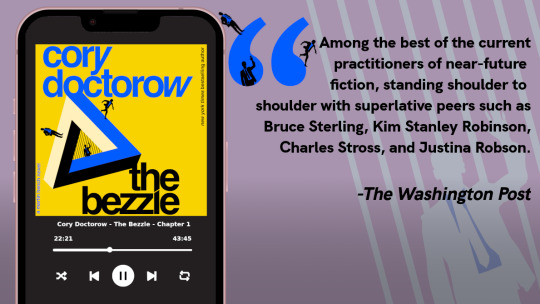
I'm Kickstarting the audiobook for The Bezzle, the sequel to Red Team Blues, narrated by @wilwheaton! You can pre-order the audiobook and ebook, DRM free, as well as the hardcover, signed or unsigned. There's also bundles with Red Team Blues in ebook, audio or paperback.

If you'd like an essay-formatted version of this post to read or share, here's a link to it on pluralistic.net, my surveillance-free, ad-free, tracker-free blog:
https://pluralistic.net/2024/01/24/everything-not-mandatory/#is-prohibited

Image:
Belem (modified)
https://commons.wikimedia.org/wiki/File:Desire_path_%2819811581366%29.jpg
CC BY 2.0
https://creativecommons.org/licenses/by/2.0/deed.en
#pluralistic#desire paths#design#drm#everything not mandatory is prohibited#apps#ip#innovation#user innovation#technological self-determination#john deere#twitter#felony contempt of business model
3K notes
·
View notes
Link
This is soooooo interesting. The Romans were the ancient world’s materials-technology engineers par excellence: this is just another example of it.
6K notes
·
View notes
Text


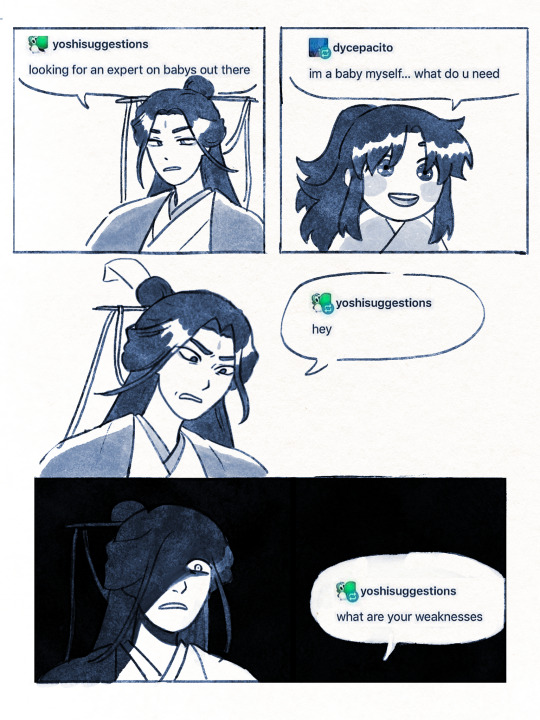
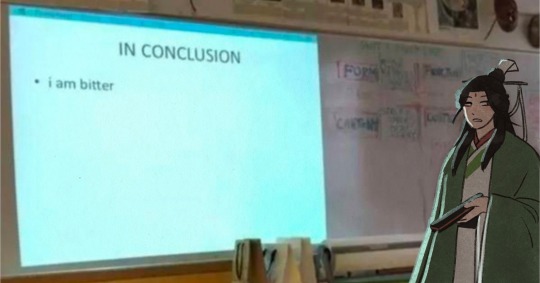
hi. im back with more shen jiu-isms.
#svsss#shen jiu#this fucking guy#he's so much#luo binghe#scum villains self saving system#pippart#ive never used tiktok before. dont look too deep into why lqg's face is there. im technologically illiterate. please understand.
5K notes
·
View notes
Text
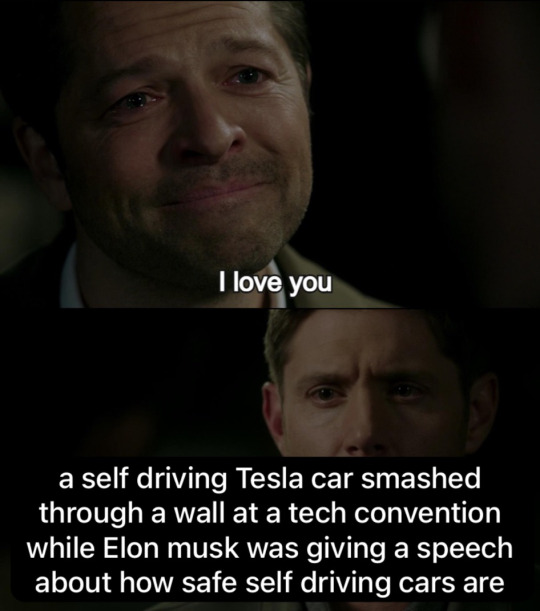
#you can’t make this shit up#Elon musk#Technology#self driving cars#Tesla#ai and big data expo#unreality#destiel meme#Fake-destiel-News#this is fake news#truth: this has not happened
1K notes
·
View notes
Text
it's quite offputting to me when ppl can't disentangle their hatred for capitalism from a hatred for... new technological innovation? the ways in which capitalism has shaped the development of certain technologies has been deeply negative, not to mention that imperialism ensures that new technology is usually produced via extractive relationships with both the planet + ppl in the global south.
but this weird tying of capitalist impact on innovation (+the idea of what is/is not innovation) to hatred of innovation itself (or even more disturbing valorization of "the good old days"/implications that technology is causing social degeneracy) is baffling to me. perhaps it is impossible to achieve specific technologies without unconscionable resource extraction practices, in which case they should not be pursued. but so many ppl act like there is something inherently morally suspect in pursuit of tech such as autonomous vehicles or AI or automation, independent of the material conditions that produced them/that they may produce.
tesla is evil because they exploit ppl for profit + participate in an economy built on the exploitation of the global south + use 'innovation' as a marketing tool to mask serious safety concerns. they're not evil bcuz they want to make vehicles that move on their own. there are actually a great deal of fantastic applications for vehicles which move on their own? equating technology with moral decay is not a radical position; you need a material analysis of why technological innovation has become characterized by harmful practices.
#just saw a truly tragic article abt a death related to self driving car#entire comments section SWAMPED with the implication that any attempts to create self driving cars is INHERENTLY EVIL#like. actually fully automated public transportation would be dead fucking useful#public transit is not currently fully automated + is extremely limited in many cities#im so tired of ppl who need the technology to also be BAD to call out the practices which produced it#things do not need to be black/white for u to understand that exploiting others is morally wrong...
153 notes
·
View notes
Text
making ur phone useful౨ৎ ˖ ࣪⊹🎀
delete photos that dont hold value to u -> you'll have more storage and you'll make ur camera gallery to be meaningful
delete apps u dont use anymore -> honestly, if u dont use the app then its just taking up unnecessary space
time limits -> you'll give ur time meaning again when u dont spend it doom-scrolling, so if u struggle with self control, set a time limit on ur apps or flat-out delete social media
download productive apps -> apps that'll help u actually get things done and progress r apps that u wanna keep, such as language learning apps, studying apps, schedules and to-do lists etc
decorate -> make ur phone PRETTY, decorate it with cute widgets and apps, an adorable phone case and wallpaper, decorating it my favorite thing to do with my phone

ur phone can either propel u forward, or push u backwards depending on what u use it for 💗
#self concept#it girl#becoming that girl#self care#self love#advice#that girl#it girl energy#dream life#dream girl#self development#self improvement#self help#technology#girlblogger#hyper femininity
297 notes
·
View notes
Text
I think it would be funny if in season 2 it becomes a running gag of Vox sending spies to the hotel who just end up captured into the net of found family and friendship and become part of the clientele and Vox doesn’t get why he keeps losing contact with them (and assumes Alastor probably killed them) until one day Charlie comes to personally thank him for bringing her so many souls for rehabilitation and for believing in her cause and Vox just. Doesn’t know what is happening. And short circuits.
#I love how the vees are like#so bad at being antagonists that they loop around to actually helping the plot#then charlie offers vox a spot at the hotel if he ever feels he needs#and it takes all of his self-control not to laugh in her face#but#this is an opening#maybe he can see for himself what alastor is up to#(and then my self-indulgent unrealistic brain goes to and then he also gets sucked into the clientele without realizing)#he would die without access to his gamer room of screens tho#and alastor keeps trying to ban his technology from the hotel#but vox just sends charlie one of his pathetic expressions#‘but it reminds me of home’#and charlie folds immediately#allows him some installation of his screens in his own room#yeah I know this is unrealistic but shh#hazbin hotel#hazbin vox
125 notes
·
View notes
Text
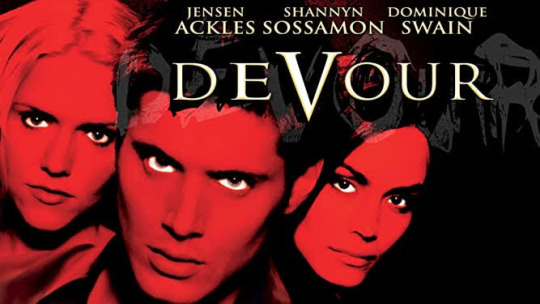
SUMMARY: The story follows Jake Gray, a young man who's been having bizarre visions of murder and self-mutilation, and his experience with a live roleplay-like online game called "The Pathway".
The mod has not seen this movie, but reading the Wikipedia description, it sounds nuts in the best way.
#devour (2005)#supernatural horror#technological horror#demon#2000s#united states#north american movie#mentionable warning#suicide#self harm#horror#movies#poll#more than 50% havent heard
178 notes
·
View notes
Text
DP x DC PROMPT
Jasmine Al'Ghul has her time divided into simple quarters.
Make sure Danyal Al'Ghul is well taken care of with the Fenton family ( no wonder anyone who bullies Danny or his friends end up missing [in this au]).
Teach and care for Damain Al'Ghul inside the league.
Train into becoming a better shadow and right hand for the next heir.
Complete missions for Ra Al'Ghul himself.
Fortunately, Taila has decided it would be for best for Jasmine to continue caring for Danyal as Damian goes to live with his father while she deals with the leagues problems and search for her missing father.
That means Jasmine will not be spending time with Damian during his ( sister time) six months. And he will realise that after she doesn't come after 8 months to his father's family/house.
Unfortunately for everyone, Damian refuses to live without his beloved elder sister, and will do anything to take her back.
---------
Now, do Damian and Danny hate each other for taking up sister time or do they love each other?
#Since Jazz is taught by the best.#Danny's accident will not happen#instead she makes sure the portal works without her getting hurt too#danny is taught by jazz how to assassin#so he defeats ghosts with technology while his siter takes care of stronger opponents#OR#jaz defeats ghosts by herself to ensure Danny's safety#Damian wants his big sister DAMIT#no taila he will NOT STAND FOR THIS#dp x dc#dc x dp#dpxdc#dcxdp#Bruce just wondering why damian is obsessed with this random civilian to the point of him creating a new bat persona for her#why is she the al ghuls whole family brain cell holder#because she reads self help books#duh
262 notes
·
View notes
Text
Cloudburst

Enshittification isn’t inevitable: under different conditions and constraints, the old, good internet could have given way to a new, good internet. Enshittification is the result of specific policy choices: encouraging monopolies; enabling high-speed, digital shell games; and blocking interoperability.
First we allowed companies to buy up their competitors. Google is the shining example here: having made one good product (search), they then fielded an essentially unbroken string of in-house flops, but it didn’t matter, because they were able to buy their way to glory: video, mobile, ad-tech, server management, docs, navigation…They’re not Willy Wonka’s idea factory, they’re Rich Uncle Pennybags, making up for their lack of invention by buying out everyone else:
https://locusmag.com/2022/03/cory-doctorow-vertically-challenged/
But this acquisition-fueled growth isn’t unique to tech. Every administration since Reagan (but not Biden! more on this later) has chipped away at antitrust enforcement, so that every sector has undergone an orgy of mergers, from athletic shoes to sea freight, eyeglasses to pro wrestling:
https://www.whitehouse.gov/cea/written-materials/2021/07/09/the-importance-of-competition-for-the-american-economy/
But tech is different, because digital is flexible in a way that analog can never be. Tech companies can “twiddle” the back-ends of their clouds to change the rules of the business from moment to moment, in a high-speed shell-game that can make it impossible to know what kind of deal you’re getting:
https://pluralistic.net/2023/02/27/knob-jockeys/#bros-be-twiddlin
To make things worse, users are banned from twiddling. The thicket of rules we call IP ensure that twiddling is only done against users, never for them. Reverse-engineering, scraping, bots — these can all be blocked with legal threats and suits and even criminal sanctions, even if they’re being done for legitimate purposes:
https://locusmag.com/2020/09/cory-doctorow-ip/
Enhittification isn’t inevitable but if we let companies buy all their competitors, if we let them twiddle us with every hour that God sends, if we make it illegal to twiddle back in self-defense, we will get twiddled to death. When a company can operate without the discipline of competition, nor of privacy law, nor of labor law, nor of fair trading law, with the US government standing by to punish any rival who alters the logic of their service, then enshittification is the utterly foreseeable outcome.
To understand how our technology gets distorted by these policy choices, consider “The Cloud.” Once, “the cloud” was just a white-board glyph, a way to show that some part of a software’s logic would touch some commodified, fungible, interchangeable appendage of the internet. Today, “The Cloud” is a flashing warning sign, the harbinger of enshittification.
When your image-editing tools live on your computer, your files are yours. But once Adobe moves your software to The Cloud, your critical, labor-intensive, unrecreatable images are purely contingent. At at time, without notice, Adobe can twiddle the back end and literally steal the colors out of your own files:
https://pluralistic.net/2022/10/28/fade-to-black/#trust-the-process
The finance sector loves The Cloud. Add “The Cloud” to a product and profits (money you get for selling something) can turn into rents (money you get for owning something). Profits can be eroded by competition, but rents are evergreen:
https://pluralistic.net/2023/07/24/rent-to-pwn/#kitt-is-a-demon
No wonder The Cloud has seeped into every corner of our lives. Remember your first iPod? Adding music to it was trivial: double click any music file to import it into iTunes, then plug in your iPod and presto, synched! Today, even sophisticated technology users struggle to “side load” files onto their mobile devices. Instead, the mobile duopoly — Apple and Google, who bought their way to mobile glory and have converged on the same rent-seeking business practices, down to the percentages they charge — want you to get your files from The Cloud, via their apps. This isn’t for technological reasons, it’s a business imperative: 30% of every transaction that involves an app gets creamed off by either Apple or Google in pure rents:
https://www.kickstarter.com/projects/doctorow/red-team-blues-another-audiobook-that-amazon-wont-sell/posts/3788112
And yet, The Cloud is undeniably useful. Having your files synch across multiple devices, including your collaborators’ devices, with built-in tools for resolving conflicting changes, is amazing. Indeed, this feat is the holy grail of networked tools, because it’s how programmers write all the software we use, including software in The Cloud.
If you want to know how good a tool can be, just look at the tools that toolsmiths use. With “source control” — the software programmers use to collaboratively write software — we get a very different vision of how The Cloud could operate. Indeed, modern source control doesn’t use The Cloud at all. Programmers’ workflow doesn’t break if they can’t access the internet, and if the company that provides their source control servers goes away, it’s simplicity itself to move onto another server provider.
This isn’t The Cloud, it’s just “the cloud” — that whiteboard glyph from the days of the old, good internet — freely interchangeable, eminently fungible, disposable and replaceable. For a tool like git, Github is just one possible synchronization point among many, all of which have a workflow whereby programmers’ computers automatically make local copies of all relevant data and periodically lob it back up to one or more servers, resolving conflicting edits through a process that is also largely automated.
There’s a name for this model: it’s called “Local First” computing, which is computing that starts from the presumption that the user and their device is the most important element of the system. Networked servers are dumb pipes and dumb storage, a nice-to-have that fails gracefully when it’s not available.
The data structures of source-code are among the most complicated formats we have; if we can do this for code, we can do it for spreadsheets, word-processing files, slide-decks, even edit-decision-lists for video and audio projects. If local-first computing can work for programmers writing code, it can work for the programs those programmers write.
Local-first computing is experiencing a renaissance. Writing for Wired, Gregory Barber traces the history of the movement, starting with the French computer scientist Marc Shapiro, who helped develop the theory of “Conflict-Free Replicated Data” — a way to synchronize data after multiple people edit it — two decades ago:
https://www.wired.com/story/the-cloud-is-a-prison-can-the-local-first-software-movement-set-us-free/
Shapiro and his co-author Nuno Preguiça envisioned CFRD as the building block of a new generation of P2P collaboration tools that weren’t exactly serverless, but which also didn’t rely on servers as the lynchpin of their operation. They published a technical paper that, while exiting, was largely drowned out by the release of GoogleDocs (based on technology built by a company that Google bought, not something Google made in-house).
Shapiro and Preguiça’s work got fresh interest with the 2019 publication of “Local-First Software: You Own Your Data, in spite of the Cloud,” a viral whitepaper-cum-manifesto from a quartet of computer scientists associated with Cambridge University and Ink and Switch, a self-described “industrial research lab”:
https://www.inkandswitch.com/local-first/static/local-first.pdf
The paper describes how its authors — Martin Kleppmann, Adam Wiggins, Peter van Hardenberg and Mark McGranaghan — prototyped and tested a bunch of simple local-first collaboration tools built on CFRD algorithms, with the goal of “network optional…seamless collaboration.” The results are impressive, if nascent. Conflicting edits were simpler to resolve than the authors anticipated, and users found URLs to be a good, intuitive way of sharing documents. The biggest hurdles are relatively minor, like managing large amounts of change-data associated with shared files.
Just as importantly, the paper makes the case for why you’d want to switch to local-first computing. The Cloud is not reliable. Companies like Evernote don’t last forever — they can disappear in an eyeblink, and take your data with them:
https://www.theverge.com/2023/7/9/23789012/evernote-layoff-us-staff-bending-spoons-note-taking-app
Google isn’t likely to disappear any time soon, but Google is a graduate of the Darth Vader MBA program (“I have altered the deal, pray I don’t alter it any further”) and notorious for shuttering its products, even beloved ones like Google Reader:
https://www.theverge.com/23778253/google-reader-death-2013-rss-social
And while the authors don’t mention it, Google is also prone to simply kicking people off all its services, costing them their phone numbers, email addresses, photos, document archives and more:
https://pluralistic.net/2022/08/22/allopathic-risk/#snitches-get-stitches
There is enormous enthusiasm among developers for local-first application design, which is only natural. After all, companies that use The Cloud go to great lengths to make it just “the cloud,” using containerization to simplify hopping from one cloud provider to another in a bid to stave off lock-in from their cloud providers and the enshittification that inevitably follows.
The nimbleness of containerization acts as a disciplining force on cloud providers when they deal with their business customers: disciplined by the threat of losing money, cloud companies are incentivized to treat those customers better. The companies we deal with as end-users know exactly how bad it gets when a tech company can impose high switching costs on you and then turn the screws until things are almost-but-not-quite so bad that you bolt for the doors. They devote fantastic effort to making sure that never happens to them — and that they can always do that to you.
Interoperability — the ability to leave one service for another — is technology’s secret weapon, the thing that ensures that users can turn The Cloud into “the cloud,” a humble whiteboard glyph that you can erase and redraw whenever it suits you. It’s the greatest hedge we have against enshittification, so small wonder that Big Tech has spent decades using interop to clobber their competitors, and lobbying to make it illegal to use interop against them:
https://locusmag.com/2019/01/cory-doctorow-disruption-for-thee-but-not-for-me/
Getting interop back is a hard slog, but it’s also our best shot at creating a new, good internet that lives up the promise of the old, good internet. In my next book, The Internet Con: How to Seize the Means of Computation (Verso Books, Sept 5), I set out a program fro disenshittifying the internet:
https://www.versobooks.com/products/3035-the-internet-con
The book is up for pre-order on Kickstarter now, along with an independent, DRM-free audiobooks (DRM-free media is the content-layer equivalent of containerized services — you can move them into or out of any app you want):
http://seizethemeansofcomputation.org
Meanwhile, Lina Khan, the FTC and the DoJ Antitrust Division are taking steps to halt the economic side of enshittification, publishing new merger guidelines that will ban the kind of anticompetitive merger that let Big Tech buy its way to glory:
https://www.theatlantic.com/ideas/archive/2023/07/biden-administration-corporate-merger-antitrust-guidelines/674779/
The internet doesn’t have to be enshittified, and it’s not too late to disenshittify it. Indeed — the same forces that enshittified the internet — monopoly mergers, a privacy and labor free-for-all, prohibitions on user-side twiddling — have enshittified everything from cars to powered wheelchairs. Not only should we fight enshittification — we must.
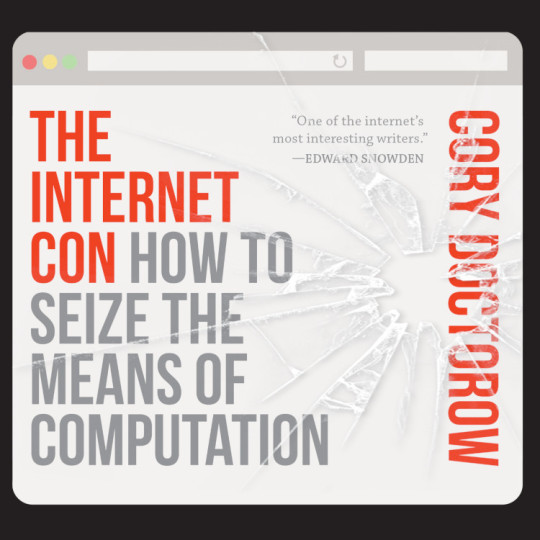
Back my anti-enshittification Kickstarter here!

If you’d like an essay-formatted version of this post to read or share, here’s a link to it on pluralistic.net, my surveillance-free, ad-
free, tracker-free blog:
https://pluralistic.net/2023/08/03/there-is-no-cloud/#only-other-peoples-computers

Image:
Drahtlos (modified)
https://commons.wikimedia.org/wiki/File:Motherboard_Intel_386.jpg
CC BY-SA 4.0
https://creativecommons.org/licenses/by-sa/4.0/deed.en
—
cdsessums (modified)
https://commons.wikimedia.org/wiki/File:Monsoon_Season_Flagstaff_AZ_clouds_storm.jpg
CC BY-SA 2.0
https://creativecommons.org/licenses/by-sa/2.0/deed.en
#pluralistic#web3#darth vader mba#conflict-free replicated data#CRDT#computer science#saas#Mark McGranaghan#Adam Wiggins#evernote#git#local-first computing#the cloud#cloud computing#enshittification#technological self-determination#Martin Kleppmann#Peter van Hardenberg
886 notes
·
View notes
Text
The term “social transition” has a non-trans history in the psychology of adolescence. In the 1980s, it was an operative metaphor for describing adolescence through the American trope of a rocky period of self-making, what one psychologist in 1978 termed “the difficulty of adolescence as a transitional period.” The primary “transition” that concerned psychologists at the time was school, where social shifts in friend groups and hierarchies from middle school to high school affected a young person’s self-esteem and mental integrity, resulting either in positive self-actualization or, if the social transition went poorly, “problem behavior.”³
The term “social transition” was only later adopted by psychologists and psychiatrists looking to powerfully expand their jurisdiction over trans youth to include entirely non-medical practices that often spur parents to reject or harm their kids: wearing a dress, cutting or growing out hair, wearing a binder or a bra, wearing makeup, or adopting a new name and pronouns. Making those banal but concrete practices of changing gender into psychiatric events was intended to convince anxious and angry parents that they shouldn’t put down their children. By the same token, tying practices of clothing and self-description to healthy development overinflated them with a pathological degree of significance, upping the ante and creating a lucrative target, both for parents of trans youth who wanted to stop their children from transitioning and, now, politicians.
I don’t mean to imply that psychiatry directly caused HB 2885, just that it clearly holds one part of the blame for inventing the root vulnerability that Gragg has taken advantage of in Missouri. If anything, the attachment of sex offender felonies to a teacher complimenting a teenager’s haircut exposes, once and for all, how fraudulent the medicalization of transition has been all along. Gragg can claim the right of the state to control children’s dress and speech (masquerading as the rights of parents) through teachers and counselors, in part, because psychiatry and medicine first claimed the right to regulate trans youth’s practices of transition.
Still, the causal events that led to HB 2885 run far deeper than the shallow history of “social transition” as an especially foolish psychiatric fiction. Here lies the far bigger problem raised by this bill. Not only will psychiatrists prove to be the least effective political allies of trans youth in Missouri, but contemporary queer and transgender culture’s elevation of the private right to dress as the sine qua non of politics is also quite useless as a political strategy.
Part of what I gather stuns in bills like HB 2885 is their audacity. The law would target the most conservative, least politically subversive of all transgender practices: individual style, identification, and language-use. In the case of minors, “social transition” is also a cheap compromise offered to young people who are refused blockers and hormones by disapproving parents and doctors, but that compromise is offered in a broader queer and transgender culture that has elevated self-identification through style as the ultimate arbiter of being transgender, making it much harder to advocate for a genuine right to transition for anyone, teenager or adult.
[...]
Students have very limited First Amendment rights on school campuses, meaning that they cannot present themselves as private individuals enjoying the right to dress as they please.⁷Their self-expression is governed from the outset by a competing set of custodians, from parents to schoolteachers, to psychiatrists and doctors, to the Missouri House of Representatives. Trans youth’s interests are therefore materially extraneous to the mainline of contemporary queer and transgender culture, whose architects were wealthy, college-educated adults whose prior enjoyment of full-citizenship was the very reason they demanded only the affirmation of a right to dress.
I suspect that part of the genuine shock of bills like HB 2885 is that most people reasoned that LGBT liberalism’s elevation of the private individual over all other political concerns would inoculate dress and language from state interference. It evidently has not. What perhaps has been misunderstood, then, is how the state exercises power. The law cannot prohibit being transgender, for there is no such state of being. The state has no need to target people’s interior selves, either, for the law can seize people where it always has, in concrete social practices that it simply declares are the undesirable traits of transgender people—namely, practices of transition.
Jules Gill-Peterson, The Unimportance of Wearing Clothes.
[emphasis added]
#antipsychiatry#psychiatry#jules gill peterson#trans#cissexism#mine#readings#i don't agree with her 100% here on the relative conservatism of social transition and advocacy for it [or the discounting of#trans virtuality writ large] but this is immensely important context through which to approach the increasing enclosure of myriad healthcar#technologies & broader technologies of 'self' from tgnc ppl#especially as she points out young ppl#adultism#ageism
56 notes
·
View notes
Text


"Most young patrollers who exchanged north of the Dead Lake took primed knives from home along. About half the patrollers returned, ready to take up expanded duties. None of the knives did. A steady stream of sacrifice, flowing northward."
#Lois McMaster Bujold#The Sharing Knife#TheSharingKnife#fanart#my art#I continue to be absolutely insane about the worldbuilding in this series#The legacy of guilt and responsibility and power and duty#the sharing knives as a physical manifestation of sacrifice and all the grief and anguish that entails#the bitter culture clashes between the people who carry this burden in self-important secrecy#and the people they defend but do not trust or respect (even as their growing technology conquers more and more of the world)#The lessons to be learned on both sides if they're going to make a way forward#''No farmer child. You've always had our protection.''#''If you were traditional you'd put a torch to every house in New Moon Camp. Because traditional Lakewalkers don't defend. We run.''#''You're only clenching your hands so tight because you have so little left in them.''#I'm normal about this#fatal rambling in the tags
50 notes
·
View notes
Text



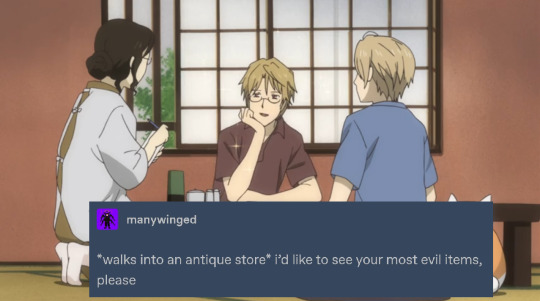
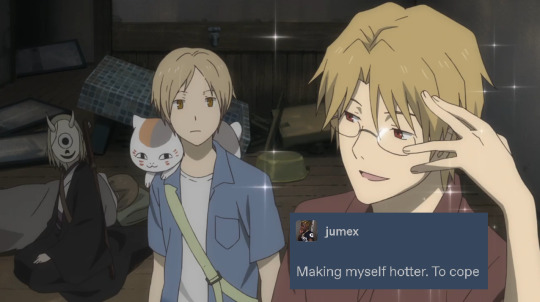
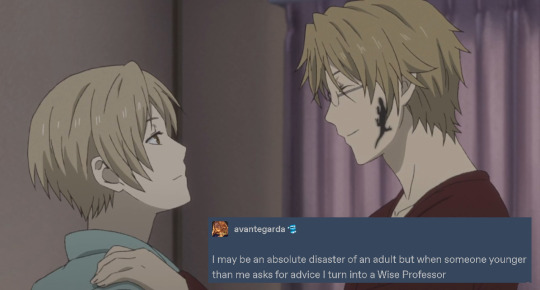
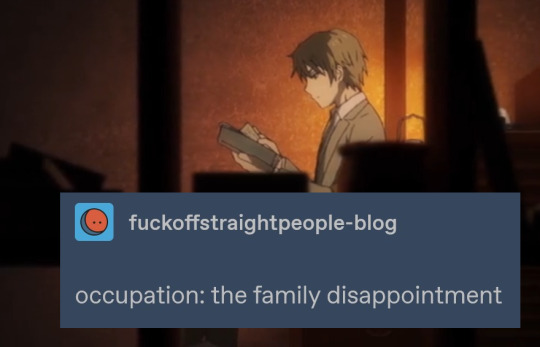



[Image description: 10 stills from the anime "Natsume's Book of Friends" featuring the character Natori Shuuichi with tumblr text posts edited in.
Image 1: Natori is waving and smiling in front of a background of sparkles and roses. The text post is by tumblr user YandereChild-Archive and reads "me, introducing myself: it is i, your local asshole"
Image 2: Natori, Hiiragi, Natsume, and Nyanko-sensei are standing in the wreckage of Natori's spare room after an exorcism. Text post by RoseCrystal reads "should i get my life together or should i just keep being sexy and chaotic"
Image 3: Close-up of Natori's smirking face in profile. Text post by ShirleyTemplar-Blog reads "I may seem like an asshole / but deep down I'm a good person / and even deeper down I'm a bigger asshole"
Image 4: At an udon restaurant, Natori is asking the server if she's seen or heard of anything weird in the area lately. He's posed casually with his chin resting in his hand and has sparkles around him. Text post by ManyWinged reads "*walks into an antique store* i'd like to see your most evil items, please"
Image 5: After a sleepless night, Natori is smiling and posing with sparkles surrounding him. Natsume, sensei, and Hiiragi look on, unimpressed. Text post by jumex reads "Making myself hotter. To cope"
Image 6: Natori is smiling at Natsume, his hand on Natsume's shoulder. Text post by avantegarda reads "I may be an absolute disaster of an adult but when someone younger than me asks for advice I turn into a Wise Professor"
Image 7: Teenage Natori is sitting in his family's storeroom at night, reading. Text post by FuckOffStraightPeople-Blog reads "occupation: the family disappointment"
Image 8: Teenage Natori glares at an offscreen Matoba. Text post reads "when people explain things to me i see red. if i wanted to understand iw ould have understood. leave me alone ."
Image 9: Wearing a bucket hat in an attempt to go incognito, Natori leans against a huge advertisement for his album "Unloved", half of which is a photo of his face. Text post by BPDSuperBoy reads "the lengths i would go to to both get attention and avoid it...astounding"
Image 10: On a poster for one of his movies, a sultry Natori smirks at the viewer, his hand poised to comb through his hair. The lizard youkai is visible on his cheek. Text post by semiotextiana reads "im so sexy and fun and fucking doomed"
/end ID]
BONUS: live teen reaction!

[ID: Watched by a crowd of people, an embarrassed Natsume pushes Natori in front of him. Natori looks serene and is surrounded by a purple cloud of sparkles. Text post by LauraMercierBodyScrub reads "cause of death: second hand embarrassment" /end ID]
sorry for being obsessed with this three-alter-egos-in-a-trenchcoat 20-something big bother figure disaster-ass man. as if it's my fault 🙄
natsuyuu characters as text posts 1/?
#sorry for thinking about this pathetic loser day and night. as if i had a choice in the matter!!!!!#natsume's book of friends#natsume yuujinchou#natsuyuu characters as#text posts#natori shuuichi#links#my posts#at LEAST three alter egos in a trenchcoat. only three we can be confident of...though scientists have conjectured the existence#of up to seven so far...with the possibility of finding more every day...#it's just very hard to isolate them in the lab. we're trying but we're not there yet. we just don't have the technology#every time we think we've stripped away all alter egos & identified the One True Self it turns out to be just another alter ego#don't tell the grant review committee but i'm beginning to think there's no such thing as a one true self lads :/
109 notes
·
View notes
Text

#self#philosophy#cosmos#astronomy#science#social media#universe#wrong hands#john atkinson#webcomic#cosmic perspective#existentialism#technology
41 notes
·
View notes
Text
I lied actually I’m not normal at all
#GrrhrhHRHRG#something something#the puppet of the iterator is the first thing we think of#when i design my iterators I do the puppet first#we don’t talk to pebbles until we reach his puppet#and isn’t that something#a tiny itty bitty sliver (heh) of a fraction of the iterator’s wider self and here we are focusing on it#which is the intent! That’s what it’s there for. but it’s so… ough#like it’s so easy to see moon’s puppet and think of that as the extent#when she’s in reality miles and miles of decaying metal under the sea#(I’m normal abt submerged superstructure)#and it’s like … thinking abt “godlike in comparison”#if iterators are gods#then puppets are their avatars#avatar. a god’s way of interacting with the world#avatar. our way of interfacing with technology#avatar. an iterator’s face.#all but the tiniest fraction meant to represent the whole#isn’t that so …. Hjhdhdh#and like … the way that some iterators clearly project onto their puppet#calling themselves trapped in a box#and like yeah that makes sense#you’re a monolith of metal and flesh and wires and electricity#and you were given an avatar. a face. why wouldn’t you invest yourself into the representation of yourself#kind of like how we might project on our gaming avatars or online personas… I digress#without that avatar—without that Focal Point—would an iterator get lost in their own enormity?#would it be so much easier to think of themselves as Just a machine?#and the other way — w off the string stuff#an avatar is only meant to Represent the higher being behind it#an avatar can never truly contain it
53 notes
·
View notes
Text
the thing that gets me about the lack of technological literacy in a lot of young gen z and gen alpha (NOT ALL. JUST A LOT THAT I SEE.) isn't necessarily the knowledge gap so much as it's the lack of curiosity and self-determination when it comes to interacting with technology.
you have the knowledge gap side of things, obviously, which highlights issues related to the experience of using pieces of hardware/software becoming detached from the workings of the hardware/software itself. you start seeing people (so called "ipad kids") who are less and less familiar with the basics of these machines—like knowing how to explore file and system directories, knowing what parts of the system and programs will be using the most power and interacting with each other, knowing what basics like RAM and CPU are and what affects them etc. these aren't things you need to sink a lot of time into understanding, but they seem to be less and less understood as time has gone on.
and this lack of familiarity with the systems at work here feeds into the issue that bothers me a lot more, which is a lack of curiosity, self-determination, and problem solving when younger people use their technology.
i'm not a computer scientist. i'm not an engineer. i have an iphone for on-the-go use and i have a dinky 2017 macbook air i use almost daily. that's it! but i know how to pirate things and how to quality check torrented material. i know how to find things in my system directories. i know how to format an external hard drive for the specifications of my computer. i know how to troubleshoot issues like my computer running slowly, or my icloud not syncing, or more program-specific problems. this is NOT because i actually know a single thing about the ~intricacies~ of hardware or software design, but because i've taken time to practice and to explore my computer systems, and MOST IMPORTANTLY!! to google things i don't know and then test out the solutions i find!!!!
and that sounds obvious but it's so clear that its just not happening as much anymore. i watched a tiktok the other day where someone gave a tutorial on how to reach a spotify plugin by showing how to type its url in a phone's browser search bar, then said "i'll put the url in the comments so you guys can copy and paste it!!!!!" like ?????? can we not even use google on our own anymore?? what's happening???
this was a long post and it sounds so old of me but i hear this lack of literacy far too much and the defence is always that it's not necessary information to know or it's too much work but it is necessary for the longevity and health of your computers and the control you have over them and it ISN'T too much work at all to figure out how to troubleshoot system issues on your own. like PLEASE someone help.
#part of it is at the fault of the technology itself#phones and tablets hide a lot of their system workings in favour of app-forward interfaces#unlike pcs and laptops which have them easily accessible at start up#but once again.... the lack of curiosity... troubleshooting.... problem solving#long post#and this isn't even going into the lack of problem-solving and self-driven research when it comes to interacting with media#the ''what song is this????'' ''what movie is this???'' ''what is this from????'' PLEASE where is the LOOKING the SEARCHING the FINDING OUT
49 notes
·
View notes